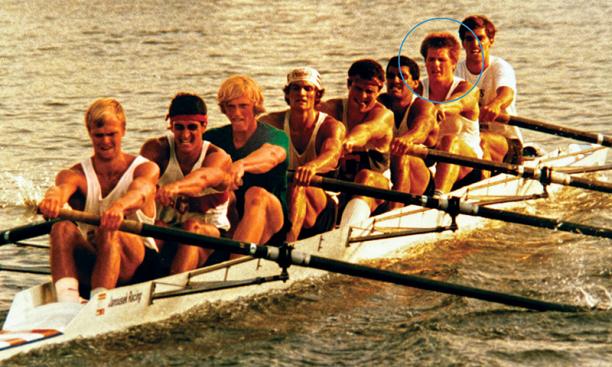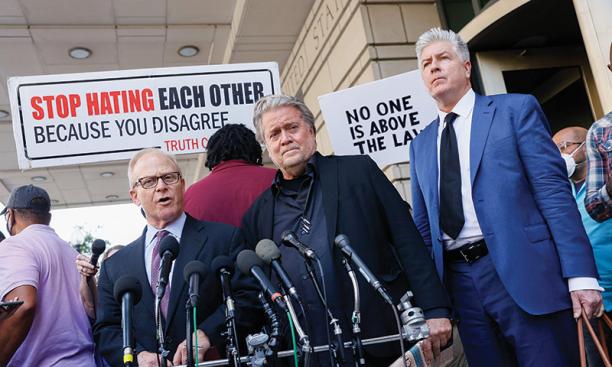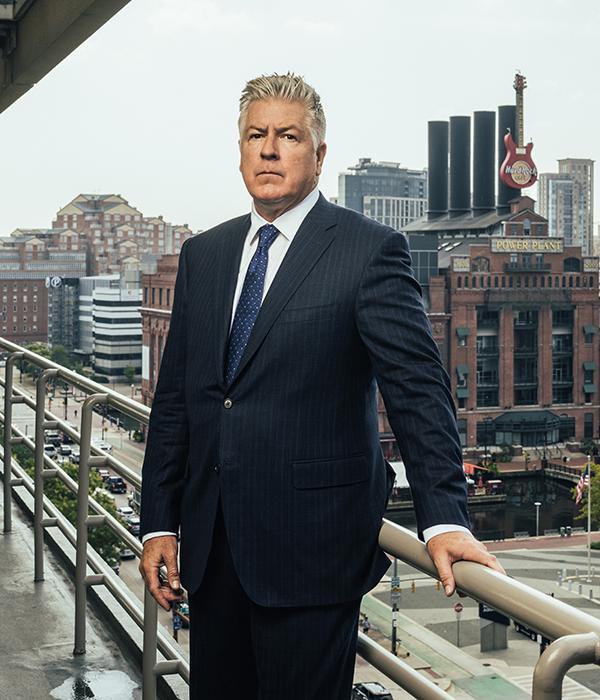Scaling formidable peaks around the world has taught M. Evan Corcoran ’86 lessons about his professional pursuits.
“Not too many years ago, my [Princeton] roommates Gordon P. Ritter ’86 and J. Adair Prall ’86 and I took up mountain climbing,” says Corcoran, an attorney in the Baltimore firm Silverman Thompson. “Through that, I learned that if you want to get to the summit, you have to accept risk.”
When Corcoran agreed to represent former President Donald Trump and Trump’s former chief strategist, Steve Bannon, as clients, the philosophy took on a different meaning.
Corcoran entered the national political spotlight in his role representing the 45th president in investigations that have led to two federal indictments. First, he was Trump’s lead attorney in the probe of Trump’s handling of classified documents. Corcoran and his firm withdrew from that case in March after Corcoran was compelled to testify before a grand jury. Trump and two other defendants have been indicted on 40 counts, including charges of conspiring to hide classified documents at Trump’s Mar-a-Lago residence. Trump has pleaded not guilty.
Corcoran, who is identified as “Trump Attorney 1” in the indictment, is not facing charges, but audio recordings and what he transcribed from his communications with Trump during the period in question are key parts of the indictment. Corcoran also could be called by the prosecution to testify in the trial.
Most recently, on Aug. 1, Trump was indicted on four counts related to conspiring to overturn the 2020 election. He pleaded not guilty. Corcoran is part of a small legal team that includes Todd Blanche and John Lauro, who are tasked with defending Trump on the latest criminal charges.
Corcoran tells PAW that he can’t comment on the Trump proceedings while they are ongoing. In the Bannon case, the former Trump strategist was found guilty of two criminal counts of contempt of Congress in July 2022. Bannon refused to comply with a subpoena that required him to produce documents and testify before a select committee investigating the Jan. 6 attack. Bannon’s case is pending an appeal.
Corcoran’s decisions to represent Trump and Bannon may be controversial, but Prall says Corcoran has never let what other people think influence his work.
“I see these cases as something Evan saw as a difficult challenge, one he decided that he was up for,” says Prall, a neurosurgeon in Colorado. “The inevitable opinions of other people, some of them negative, in response to [Corcoran] serving these high-profile clients, has never been a concern he has voiced. Throughout the recent torrent of publicity, he has remained the ‘straight man’ of his legal teams, solid and determined within the maelstrom of publicity stunts and media circus, just as he has been throughout the rest of his career.”
Doug Gansler, the Democratic former Maryland attorney general and a former federal prosecutor who worked in the U.S. Attorney’s Office at the same time as Corcoran, says that if the tables had turned and a Democratic president had called Corcoran for legal help, he thinks Corcoran would have taken the case without hesitation.
“I think Evan’s a lawyer first, and represents his clients’ interests as best he can,” says Gansler, a partner in the Washington offices of Cadwalader, Wickersham & Taft LLP. “He’s a highly ethical, smart person. And I think that’s shown through. Evan is very even-keeled, keeps it close to the vest.”

The son of former Rep. Tom Corcoran (R-Ill.), Evan, 59, moved with his family to suburban Washington, D.C. from rural Illinois after his father was elected to Congress in 1976. A few years later, Evan Corcoran attended Langley High School in Virginia, where many of his classmates were the children of politicians.
“It was very different at Langley High, where there were more than 500 people in each grade,” says Corcoran, whose Illinois grade school classes had only about 20 students. “I focused on academics in high school and was admitted to Princeton and Harvard. I chose Princeton because something about the people I encountered and the campus itself made it feel more welcoming to a transplanted Midwesterner.”
Corcoran took an interest in rowing while at Princeton and was a member of the decorated 1985 heavyweight team.
“It would be hard to overstate the importance of my experiences at the Princeton boathouse, particularly winning Princeton’s first Intercollegiate Rowing Association championship [in 1985],” says Corcoran, who chronicled the team’s season in his self-published book, Wind on the Water.
Douglas Burden ’88, a vice president and investment officer with Fiduciary Trust, rowed on the heavyweight team with Corcoran, and echoes his sentiments.
“Crew built an enduring superstructure to confront challenges, manage setbacks, embrace successes, and cultivate an appreciation for how others deal with all this in different ways,” says Burden, who rowed for the U.S. in the 1988, ’92, and ’96 Olympic Games.
In addition to his collegiate crew experience, Corcoran says he fondly remembers the diverse set of classes he took — from “Personality and Political Leadership” to a modern drama class. Corcoran adds that in the past year he cited philosopher John Rawls ’43’s book A Theory of Justice in the opening of a filing for the Bannon case.
“The book informs my current work,” says Corcoran. “While some people might wonder whether my recent representations are an extension of my political views, they could not be more mistaken. I have taken on recent high-profile and politically charged cases precisely because I believe that politics should play no role in the decision whether to investigate or prosecute a person.”
Of course, any notion that the Bannon or Trump prosecutions are being driven by politics over the law is itself considered a political statement.
“Unfortunately the United States is so polarized right now, it’s becoming almost impossible to separate politics from law,” says Neama Rahmani, a former federal prosecutor who is president of the West Coast Trial Lawyers and is not connected to either the Bannon or Trump cases.
Corcoran still looks to his Princeton classmates for friendship and advice. “I feel like something is missing if a week goes by without me connecting with one or more of them,” he says.
In addition to the mountain-climbing group Corcoran has helped spearhead — some of the summits the group has scaled include Aconcagua in Argentina and Denali in Alaska — he is part of a fly-fishing group that holds an annual tournament, complete with awards and penalties. Corcoran said he has persuaded Supreme Court Chief Justice John Roberts “to serve as the ultimate arbiter of all tournament disputes.”

After Princeton, Corcoran attended Georgetown Law at night and worked full time for former Rep. Frank Wolf (R-Va.), who was a senior member of the powerful House Appropriations Committee. The experience planted the seeds for Corcoran’s path to becoming a prosecutor.
“Through that work I encountered top officials at federal law enforcement agencies who had previously served as federal prosecutors,” says Corcoran. “Many of them said that being a federal prosecutor was the best job they ever had. At that time, I knew that I wanted to be a trial lawyer. I also took to heart the unofficial Princeton motto of the time: In the Nation’s Service.”
Corcoran was a prosecutor for almost eight years, but “on the verge of parenthood” — he now has three daughters — he moved to private practice, and specifically civil litigation. Corcoran also had a brief stop in San Francisco working with Princeton classmate and financial executive Peter Briger ’86. Corcoran then went to work on his youngest brother’s Arizona ranch before his brother died following a bout with cancer.
When Corcoran returned to private practice, he landed at Silverman Thompson. Gansler had recommended the firm to Corcoran. “They didn’t have a lawyer with the experience that Evan has, running multimillion-dollar cases,” says Gansler.
The path to representing Trump started with Corcoran taking on Bannon as a client.
“I believe that the [Bannon] case will be reversed by the U.S. Court of Appeals for the District of Columbia Circuit, or the U.S. Supreme Court,” says Corcoran. “The opinion that will follow will provide much-needed clarity on the law that governs contempt of Congress actions, and will be a historic and important ruling for both the legislative and executive branches.”
Even the federal judge in Bannon’s case, Carl Nichols, says in a signed order to stay Bannon’s sentence that the appeal “raises a substantial question of law that is likely to result in a reversal or an order for a new trial.”
“It does help Bannon that executive privilege has not been litigated very much,” Rahmani says. “Without much precedent, there is a greater chance for success [on appeal]. ... I think this is the kind of case that may well go all the way to the Supreme Court to decide.”
In the Mar-a-Lago case, U.S. District Judge Beryl Howell compelled Corcoran to testify when she overruled the attorney-client privilege legal tenet because Corcoran’s legal advice may have been used to perpetrate a crime.
Reads the indictment: “Trump, in sum and substance, made the following statements, among others, as memorialized by Trump Attorney 1: ‘I don’t want anybody looking, I don’t want anybody looking through my boxes, I really don’t, I don’t want you looking through my boxes. Wouldn’t it be better if we just told them we don’t have anything here?’”
Trump said this to Corcoran on May 23, 2022, after Trump had been served with a federal grand jury subpoena, according to the indictment.
U.S. District Judge Aileen Cannon said in late July that the trial could start as early as May 20.
If that date holds, Corcoran could take the stand as a witness, and could appear in a separate courtroom as defense counsel in the Jan. 6 matter. Risks that he’s assumed as part of his continuing legal journey.
“When [Corcoran’s] in court, he’s fighting about the law, and what the law is and what the law should be, not what the politics are and should be,” says Gansler. “He certainly does not wear politics on his sleeve in the courtroom. He comes in there well-armed with legal precedent and jurisprudence.”
Christian Red is a freelance writer based in northeastern Pennsylvania.


